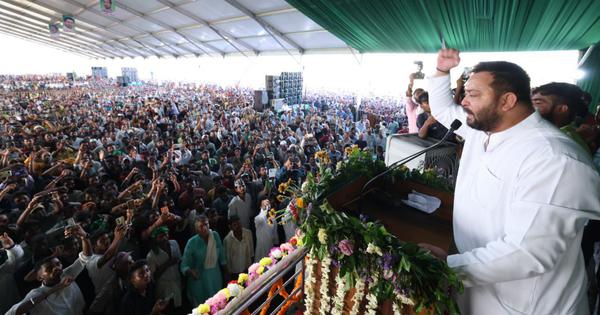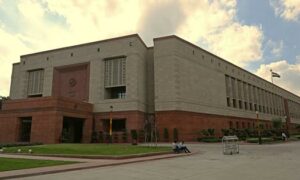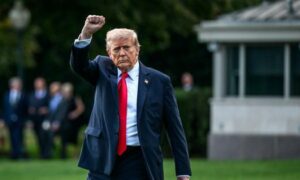
From being a rebel threatening to boycott what he claimed was a hopelessly manipulated election to an eager chief ministerial hopeful who can’t wait for the “people’s festival of change” to start, Rashtriya Janata Dal leader Tejashwi Yadav has undergone a touching restoration of faith in India’s democracy.
Not too long ago, the fire-spewing Yadav politician saw no sense in taking part in the Bihar election. “If you have rigged the whole system and have already decided who will get how many seats, why bother with elections at all,” he told the media in July.
But from the moment the Election Commission on October 6 announced the dates for the polls, he has been a different man, cheering for the same election he had us believe was a farce. Yadav now even considers himself a shoo-in in a contest that he said had been gamed in favour of the Bharatiya Janata Party.
Yadav is not the only Opposition figure to have effected a volte-face. All the state’s Opposition parties that were until only recently protesting against what they claimed were the machinations of the Election Commission to skew the playing field for the BJP are game again to participate in the polls.
They are in hectic discussions to navigate intra-party rivalries and draw up lists of candidates, negotiate seat adjustments and mobilise cadres for the campaign for the election to be held on November 6 and November 11. In sum, it’s back to business.
Just the mere announcement of election dates seems to have magically dissipated all the doubts and claims about Bihar’s Special Intensive Revision of voter rolls, the overall integrity of elections in India and the partisanship of the Election Commission.
AICC PRESS RELEASE
ASSEMBLY ELECTIONS – 2025
BIHAR
The first list of Congress candidates selected by the Central Election Committee for the ensuing elections to the Legislative Assembly of Bihar :- pic.twitter.com/uBH2EW9br9
— INC Sandesh (@INCSandesh) October 16, 2025
The Opposition parties have been claiming these past three months that the commission has been colluding with the BJP by manipulating voter lists and hindering free and fair elections with its lack of transparency and biased policies to help the governing party.
Does their sudden readiness to participate in elections now suggest India’s democracy is no longer facing an existential threat from vote theft? That there’s nothing to be worried about elections or the Election Commission anymore and all the questions the Opposition had on special intensive revision and other grave concerns of electoral irregularities have been satisfactorily addressed?
That all the allegations about the Election Commission’s malign intentions were misplaced? That the sanctity of elections in India has been restored and it’s fine to vote again? That the “hydrogen bomb” about election malpractices that Congress leader Rahul Gandhi had warned of was a false alarm?
It’s confusing, because the Congress is still trashing elections as “fixed matches” even as it is preparing to fight yet another one under the same umpire it says has been fixing them. It claims to have filed nearly 9 million complaints on Bihar Special Intensive Revision with the Election Commission, all of which were rejected and yet the party doesn’t seem too troubled. The whole special intensive revision exercise has “raised more questions than answers”, it says.
Questions that would logically cast a pall of doubt on the fairness of elections, but do not seem to deter the Congress from giving it another go.
Questions like how come 3.6 lakh people who were registered as voters in the 2024 parliamentary elections will not get to vote this November. Or, why are there five lakh duplicate names in the final voter list. Or, why is it that the 23 lakh women removed from the voter list are mostly Muslims and Dalits, and mostly from the seats that saw the closest contest in the 2020 state elections.
All of these points have been raised by the Congress itself. Activists, scholars and journalists have had a lot more questions – for years now – from the way voter lists are prepared to the way elections are conducted and votes are counted.
#Watch | Amid slogans of “Vote Chori band karo [Stop the stealing of votes],” Opposition parties began their march to the Election Commission of India from Parliament.
📹 Special arrangement pic.twitter.com/F8ceAYctk4
— The Hindu (@the_hindu) August 11, 2025
Scroll’s granular analysis of voter data from an Assembly by-poll in Uttar Pradesh points to the possibility of electoral roll tampering by way of mass deletion of Muslims and addition of non-Muslims, delivering improbable swings for the BJP. This pattern has been repeatedly highlighted in several case studies by media and civil society actors from other parts of the country as well.
An Ashoka University professor pointed to the same in a study of the 2019 general elections, and had to resign following the controversy over it.
There have been no satisfactory explanations either of the discrepancy between votes polled and votes counted, or the mystery of late-night surges in turnout figures amounting to hundreds of thousands of extra votes. Or, the delays in the release of final voter turnout data. Or, the erratic changes in electoral rolls, like in Maharashtra, where more than 40 lakh voters were added to the rolls in just six months between the Lok Sabha elections and the assembly polls.
The “purified” voter list produced by Special Intensive Revision in Bihar has only deepened the suspicions about the Election Commission’s conduct, riddled as it is with errors and dubious entries – thousands of entries with gibberish characters in their names or details and hundreds of thousands of invalid house numbers and duplicate voters, often wrongfully clubbed together in fictitious addresses.
Neither has the Election Commission explained these anomalies nor has it given any sign of seriously engaging with the alleged frailties of the poll process. Instead, armed with a new law that gives election commissioners unprecedented immunity from civil and criminal proceedings, the commission has chosen to brazen it out, evading scrutiny, stonewalling questions and treating the Opposition as an adversary rather than a stakeholder with convergent interests in a fair and transparent system of elections.
Here is a list of 10 questions asked but not answered in today’s sham of a Press Conference by the ECI
1. Why did the EC not consult political parties before undertaking SIR/
2. Why was the ECI’s own guideline about not doing Intensive Revision in an election year violated in…— Yogendra Yadav (@_YogendraYadav) August 17, 2025
So, not only do the core allegations of the whole “vote chori” campaign remain unaddressed, there are even more grounds for concern than when it was launched two months ago. The final list of deletions itself is mired in controversy and is a source of legitimate fears. The deletions have been found to be geographically concentrated in Opposition strongholds and are more pronounced in seats that saw tight races last time.
In a state where the winner got just 0.03% more votes than the Opposition last time, such dubious changes in the voter list are fraught with dangers of election fraud.
All of these make the Opposition’s readiness to plunge back into elections rather baffling. The Congress, which has led the “vote chori” campaign and did a spectacular job in taking the case to the people, alleged that the deletions from the Bihar rolls were a “well-planned conspiracy” and a “massive fraud” committed by the Election Commission “against the Constitution”.
If it is indeed so, what is the message the Congress and its INDIA allies are now sending out by participating in the Bihar election based on the same voter rolls? That they do not mind the conspiracy? Or, that they do not really mean what they say about the Election Commission and elections?
A time for accountability
Elections are times when the rulers are held to account. This election won’t be any different, but the Opposition will also have a lot to answer for this time. Its participation in the Bihar election does not only negate the very flaws it has been pointing out in the election process.
It also legitimises the Election Commission’s unprecedented appropriation of the role of verifying citizenship through Special Intensive Revision, a backdoor National Register of Citizens – the updation of which disenfranchised 1.9 million people in Assam in 2019. The government’s plan to conduct a nationwide National Register of Citizens had to be rolled back in the face of public protests at the time but will now be implemented in the guise of Special Intensive Revision of voters rolls across the country after the Bihar pilot. The Opposition will have no moral right to stand against it when that happens.
In its decision to take part in the election, the Opposition may have consciously chosen to bite the bullet to remain relevant in a political space fast shrinking for them. Given the success of the “vote chori” campaign, they may have even sensed a voter mood swing large enough to outweigh the distortions caused by election manipulation. Several analyses show that it is the tight races where voter additions and deletions make the most difference. A large swing might minimise close races.
The opposition is doing the right thing of exposing how captured the EC is. But at the end this is a political battle and has to be fought politically, on the streets. Election boycott and mass movement against fake elections are the only way forward
(https://t.co/fXbm9gj5cT) pic.twitter.com/3rF5YmoEeP— Debasish Roy Chowdhury (@Planet_Deb) August 10, 2025
But such electoral maths do little to alleviate what’s at stake here. Elections are the heart of democratic politics, providing the built-in capacity to self-correct that other forms of government do not have. When this mechanism is itself compromised, elections no longer serve as a check on creeping despotism: they enable it. And, we find ourselves in the zone of despotic elections, where the playing field is tilted in favor of the ruling party. The chances of an electoral upset are not eliminated, just sharply minimized. The opposition’s moral confusion only validates this institutional distortion that it claims to be resisting.
Democracy doesn’t just die when the rulers capture governing institutions and bend them to their will. It also dies when institutional legitimacy is further eroded by an Opposition that loses credibility as a principled and able countervailing force ready to challenge this status quo by repudiating hollowed out institutions in facing up to a totalising power – rather than play by its rules.
By rushing to take part in an electoral process it has itself critiqued as the despot’s tool, the Opposition has compromised with democratic principles. It has in the process undermined itself as a vital democratic institution. India’s democracy will pay the price for it.
Debasish Roy Chowdhury is co-author of To Kill a Democracy: India’s Passage to Despotism (OUP/Pan Macmillan)
📰 Crime Today News is proudly sponsored by DRYFRUIT & CO – A Brand by eFabby Global LLC
Design & Developed by Yes Mom Hosting






